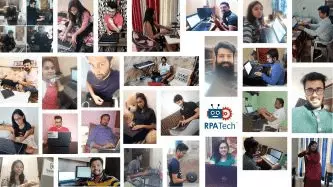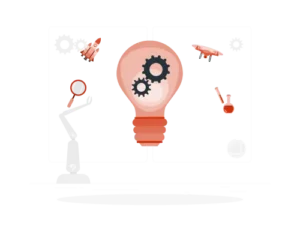Prevailing conditions mark that ongoing work from home is here to stay and it may take longer when we’ll be at our office space again. WFH is a preferred option for our team at RPATech, and we’re operational with full force to keep you better serve as ever.
As a viable option adopted globally given the existing crisis, working home can be an equally great experience if practiced with care and passion. Get a few from our experience and win it on the personal and professional front.
Professional
Challenge due to lack of patterns and traditional working types:
- Keep up everyday rituals as when you work on a regular basis – wake up at the same time, take a shower, get up, have coffee, and then resume functioning around the same time as you usually do in the workplace.
- Dress like you’re really going to work – practicing your usual habits and “dressing up” should turn you to working mode.
Challenges instead of “being at home mode”
- If you’re struggling to get into the work mode in the morning, just walk around for a while, and then open your laptop — simulate like you are commuting to the office.
- Plan your day with main tasks/objectives to be completed – maintain track of what needs to be accomplished during the day (and week and month) and specifically determine when to do/finalize it.
Often distracted / doing “aside” stuff
- Leave private life beyond the workroom (e.g. private cell phones, etc.) while you’re in there with a complete emphasis on work. To check your private messages, take a break, and do it in your personal space.
- Reward yourself and allow yourself some breaks – breaks are important to refresh the battery, they can be small (e.g., 5 minutes of checking social media) or longer (e.g., full 45 min lunch break)
- It is advised not to indulge in any household tasks/ chores during work hours. During office hours your focus should be 100% on work and after office hours 100% on your personal stuff
- Using time boxing to explicitly distinguish private activities from work – specify what is your personal time is, what is your office time is; and using calendar blocks to showtime for lunch, leisure, coffee, etc.
No adequate infrastructure/ place
- Use a separate space for work, possibly as far away from any distractions as possible – try to avoid working from the couch or a crowded area in the house
- Keep all obstacles away from your workroom/space – try to keep your private phone away and, if possible, use your headphones to suppress the noise.
- Get the necessary resources to be efficient – if possible, have a seat, a chair, a cabinet, a computer, a monitor, a spider cell, a second screen, and a printer at your disposal.
- Ensure that you have the access you need both on your mobile and your work phone – operating out of the cellar can be far from disruptive, however, it may keep you from being called.
- When you have a colleague who is still operating at home, make straightforward guidelines about who should access the office at which time and when calls can be made without “distracting” each other.
- Always make sure that your family members understand that the workplace means “work” like in the office – try to create awareness that you cannot be interrupted during office hours
- Keep your work within designated workspace – When you’re in the office, you work, however, if you’re out there, stop working and lock the laptop in your workroom.
- Avoid meals in front of the laptop, have a good lunch break, and enjoy your food, take a simple break and prepare, or it won’t be a break and raise your tension rates.
- Leverage the versatility home offices offer, e.g. while you’re waiting on customer feedback, etc., take time to run/do sports and return to function afterward.
- Provide “transitional time/space” between private life and work, e.g. a brief stroll, a run, or listening to music after completing work to specifically identify the “cut-off line”
Working overall longer hours as “always around”
- Retain operating hours as if employed daily – thoroughly establish normal working hours (both start and finish time!) during the week and hold certain days free from private/personal events.
- Keep track of when your day normally starts and ends – this will help you to observe your working hours as normal
- Stop working all day long, take set breaks where you shut your screen, e.g., get a coffee, and make rough cuts in the evening.
- It is advised to switch off your cellphone during “non-working” hours, it helps to prevent getting pulled back into work again
“Difficulties to cope with the family situation
- Commuting time can be leveraged to streamline our private life such as ., laundry, tax returns, grocery shopping but make sure that work is not hampered due to it
- Since family might is mot used to having you home all day and might assume that you are always available for them- just make sure to apprise them that the nature of work remains the same
- Segregate all activities related to personal work, household chores, and children and then schedule them keeping working hours in mind
- It is always better to allocate household chores among family members to keep the home up and running
- Discuss “child care” with your teammates and management team- this will help them understand your issues and your availability for work.
Feels like a “day off at home”
- Now that WFH is the “latest routine” for the next couple of weeks– just the workspace is changed, nothing else changes, work has to be carried out regularly as before
- Have a good working attitude – it’s not a Friday / holiday home workplace, but a regular full-time working day with the boss
- Get up early and start work early as well – before usually unproductive afternoon hours you’ve done a ton (and instead you’ve received a long time).
- Keep bonuses after accomplishing tasks, and take the time to do something you usually couldn’t do at the office (e.g. cook something good, sports, etc.).
- Use planning software to schedule your work it also reminds you what still has to be done – good examples are Focus Booster, Trello, Microsoft Planner, etc.
- When you know you are getting frustrated / demotivated, take a break – use home office space, and take a walk or switch to a different space.
Personal:
Nutritional Diet: As WHO advises, it is essential to keep good care of your health, and having a nutritious diet helps, complement it with a healthy lifestyle to double the effect.
Regular Exercise: Keep some time apart from your schedule for a workout and stick to it for your wellbeing. Do a mix of Yoga, Aerobics, and Stretching. This simple step will greatly help in keeping you fit.
Proper Hygiene: The common practice is much needed now as your hands are first to come in contact with anything. Follow proper hand wash process to disinfect and keep your space as well as belongings, essentials well sanitized.
Social Distancing: Avoid social gatherings for the time being to break the infection chain and curb the crisis. There is scientific reasoning behind that you are a carrier for the virus so save yourself and others, we insist – say home safe.
As an RPATech family, we conduct regular fun activities online to keep us connected and feel like good people’s gatherings. Wishing you the best, we urge you to stay hopeful and stay good!




